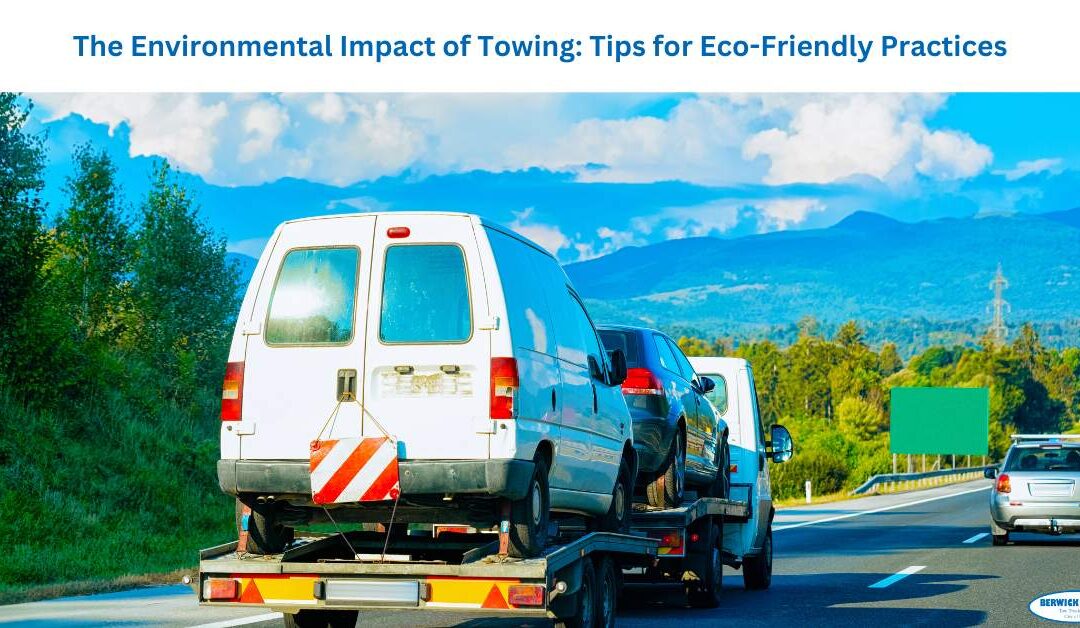The towing industry, while essential for roadside assistance, vehicle transport, and logistics, can have notable environmental impacts. Towing vehicles are typically larger, consume more fuel, and contribute to emissions that affect air quality and climate change. However, eco-friendly practices can significantly reduce these impacts, benefiting both the environment and the industry. Here’s a guide to understanding the environmental impact of towing and practical tips for more sustainable practices.
Environmental Impact of Towing
Fuel Consumption and Emissions
Towing vehicles are generally heavy-duty trucks that consume more fuel than standard vehicles. When towing a load, fuel efficiency further decreases due to the additional weight and drag.
Increased fuel consumption contributes to higher emissions of carbon dioxide (CO₂), a greenhouse gas responsible for climate change. Diesel-powered towing trucks can also release particulate matter and nitrogen oxides, which contribute to air pollution.
Noise Pollution
Many towing vehicles operate in urban areas, where their engines and machinery can contribute to noise pollution. This can affect local communities and wildlife, particularly in noise-sensitive areas near parks and nature reserves.
Material Waste
The towing industry often deals with vehicles that are damaged, sometimes leading to the generation of waste materials like plastics, metals, and fluids (oils, coolants). Without proper disposal and recycling, these materials can end up in landfills, impacting soil and water quality.
Soil and Water Contamination
Towing companies frequently handle leaking vehicles, which can result in the spillage of hazardous fluids like oil, coolant, and transmission fluids. If not managed properly, these leaks can contaminate nearby soil and water sources.
Eco-Friendly Towing Practices
Despite these environmental challenges, towing companies can adopt eco-friendly practices that minimize harm and promote sustainability. Here are several actionable tips:
Upgrade to Fuel-Efficient or Hybrid Towing Vehicles
Many towing companies now consider fuel-efficient or even hybrid towing vehicles that consume less fuel and produce fewer emissions. Advances in hybrid technology have made it possible to get heavy-duty vehicles with significantly reduced environmental impacts.
If a full fleet upgrade isn’t feasible, prioritize the use of efficient vehicles for long-distance or heavy-load towing to maximize fuel savings.
Use Biofuels and Alternative Fuels
Some towing companies are turning to biofuels or other alternative fuels, such as biodiesel or compressed natural gas (CNG), which burn cleaner than traditional diesel and gasoline.
Although alternative fuels may require engine modifications, they can reduce the carbon footprint and contribute to cleaner air, particularly in high-traffic urban areas.
Practice Regular Vehicle Maintenance
Regular maintenance, such as oil changes, air filter replacements, and tire checks, helps towing trucks operate more efficiently, reducing fuel consumption and emissions.
Properly inflated tires, for example, can improve fuel efficiency by up to 3%, and clean air filters ensure that the engine doesn’t work harder than necessary.
Implement Efficient Route Planning
Optimizing routes with GPS and route-planning software can help reduce fuel consumption and time on the road. Route optimization minimizes distance traveled and idle time, cutting down on emissions and fuel costs.
Consider scheduling multiple tows in one trip to reduce the number of trips made, maximizing fuel efficiency for each outing.
Reduce Idling Time
Idling can consume up to a gallon of fuel per hour, significantly increasing emissions. Encourage drivers to turn off engines during long waits or delays, especially in urban areas with high population density.
Installing automatic start-stop systems, which turn off the engine when idle and restart it when needed, can also save fuel and reduce emissions.
Ensure Proper Disposal of Waste Materials
Towing companies should establish protocols for recycling and safely disposing of vehicle parts and fluids. Partnering with recycling centers or waste management facilities helps ensure that metals, plastics, and hazardous fluids are processed in an environmentally safe manner.
Many regions also have regulations for handling hazardous materials. Following these standards can prevent soil and water contamination from leaking fluids.
Educate and Train Staff on Eco-Friendly Practices
Staff training is essential to making eco-friendly practices routine. Training can include best practices in fuel-efficient driving, proper waste disposal, and spill management.
Reward programs or incentives can further encourage employees to adopt these habits, contributing to a more sustainable towing operation overall.
Use Eco-Friendly Products and Materials
Many maintenance products, such as lubricants, coolants, and cleaning agents, are now available in eco-friendly formulas. Choosing biodegradable and low-toxicity products can reduce harmful environmental impacts.
When dealing with vehicle spills or leaks, opt for eco-friendly absorbent materials to clean up hazardous fluids without introducing more harmful chemicals into the environment.
Benefits of Eco-Friendly Towing Practices
Reduced Carbon Footprint
Sustainable practices lower emissions, reducing the company’s carbon footprint and contributing to global climate efforts.
Cost Savings
Fuel-efficient practices, route planning, and regular maintenance can reduce operational costs. Over time, these savings can balance out initial investments in eco-friendly technologies and practices.
Improved Brand Image
Eco-conscious customers increasingly favor businesses that prioritize environmental responsibility. A towing company with a commitment to sustainability can attract more clients, strengthening its reputation and market presence.
Regulatory Compliance
Many regions are introducing stricter environmental regulations for heavy-duty vehicles. Eco-friendly practices help towing companies stay ahead of regulatory changes, avoiding potential fines and compliance issues.
Community and Environmental Health
Reducing emissions, noise pollution, and waste benefits not only the company but also the communities and natural ecosystems where they operate. Cleaner air, water, and quieter operations create a healthier environment for everyone.
Conclusion
The environmental impact of towing is an important consideration in today’s eco-conscious world. By adopting sustainable practices, such as upgrading to fuel-efficient vehicles, reducing idling, practicing efficient route planning, and ensuring proper waste disposal, towing companies can reduce their environmental footprint and enjoy long-term benefits. Embracing eco-friendly practices not only improves the company’s bottom line but also helps foster a cleaner, healthier planet, setting a standard for sustainability in the towing industry.
If you are in Lysterfield South, Victoria 3156, Australia, and looking for a car removal service, this is the best way to visit us.
Contact Us
Berwick Towing & Transport
27B William Rd
Berwick VIC 3806
(03) 7035 7815
www..berwick-towing.com.au/

